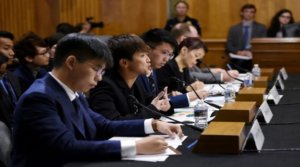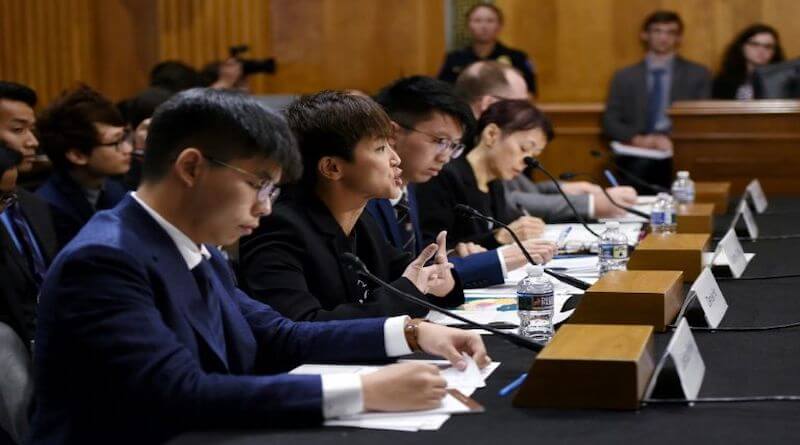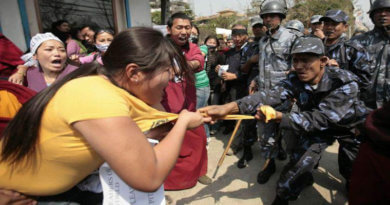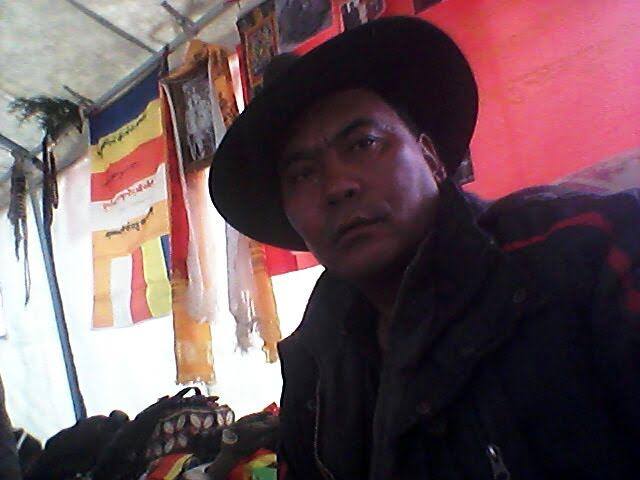Hong Kong activists press US to counter China’s erosion of city’s freedoms

Shibani Mahtani | The Washington Post | 17 September 2019
Hong Kong democracy activists presented their case before a congressional commission Tuesday for tougher U.S. action, including possible sanctions, to counter China’s steady erosion of the territory’s freedoms, as momentum builds in Washington for a more robust response.
Veteran activist Joshua Wong, musician Denise Ho, academics and a student union representative appeared before the Congressional-Executive Commission on China, which has bipartisan leadership.
In their testimonies, they echoed Hong Kong protesters who have raised alarm over alleged police brutality and China’s efforts to erode the “one country, two systems” framework under which Hong Kong is supposed to enjoy a high level of autonomy.
“Beijing shouldn’t have it both ways, reaping all the economic benefits of Hong Kong’s standing in the world while eradicating our freedoms,” said Wong, who as a teenager in 2014 was the face of Hong Kong youths calling for changes to allow the direct election of Hong Kong’s leadership. He was arrested last month in a crackdown against prominent activists, although he has not played a central role in the wave of protests that has gripped the city since June.
“Our most important demand is genuine structural change in Hong Kong, which means free elections,” he added.
Ho added that the protests, sparked by a now-shelved proposal to allow extraditions to mainland China, has “always been about fundamental conflicts” between differing values — the Chinese authoritarian model on one hand, and Hong Kong, which has a “deep attachment” to its freedoms, rule of law and human rights.
“This is not a plea for so-called foreign interference,” Ho said. “This is a plea for democracy. This is a plea for the freedom to choose.”
As a live stream of the hearing played on YouTube, the comments page flooded with comments coming in every second urging the U.S. to “liberate Hong Kong.”
With the unrest in Hong Kong showing no sign of abating despite limited concessions by the city’s government, attention has shifted to what the West can or should do to influence the situation. Protesters have been lobbying the U.S. government to pass the Hong Kong Human Rights and Democracy Act, which seeks to impose sanctions such as asset freezes and visa bans on those found to be “suppressing basic freedoms” in Hong Kong.
The bill would require an annual review of the special treatment Washington affords Hong Kong under the United States-Hong Kong Policy Act of 1992, including trade and business privileges that do not extend to mainland China. Protesters who have been arrested for participating in Hong Kong’s democracy movement in recent years could also be protected if the bill passes, as the legislation would make them eligible for U.S. visas despite their criminal records.
Beijing has railed against “foreign influence” in the Hong Kong protests, although there is scant evidence that the movement is externally funded or supported, and says it considers the situation in Hong Kong to be solely the purview of China. The Hong Kong government also has stressed that foreign legislatures should not interfere in “internal affairs.”
At a news conference Tuesday, Hong Kong leader Carrie Lam said punitive measures would only complicate the city’s problems.
“Hong Kong is undergoing a very difficult situation, and sanctions or punishment are not going to help lift Hong Kong out of this very difficult situation,” Lam said.
The Hong Kong Human Rights and Democracy Act, which is now in the Senate, has wide-ranging bipartisan support, including from House Speaker Nancy Pelosi (D-Calif.) and Sen. Marco Rubio (R-Fla.), who have both appealed to Senate Majority Leader Mitch McConnell (R-Ky.) to pass the bill. Several prominent senators have added their names to a list of co-sponsors.
Rubio, a co-chair of the China commission, said efforts around the bill have been “bicameral and bipartisan.”
“China’s leaders must respect Hong Kong’s autonomy or know that their escalating actions will lead them to face real consequences, not just from the United States but from the free world,” he said.
Rep. Jim McGovern (D-Mass.), the commission’s chairman, added Tuesday: “It is time we put the Chinese government on annual notice that further erosion of autonomy or a crackdown on Hong Kong will cause the city — and by extension mainland China — to lose its special economic and trade arrangement with the United States.”
President Trump has not commented specifically on the legislation but has urged China to deal with the situation in Hong Kong “humanely.”
Hong Kong activists, backed by leading academics, have also established the Hong Kong Democracy Council, a Washington-based group that aims to promote the city’s democratic ambitions in the capital.
“We are unified in the belief that the U.S. has a moral and political obligation to preserve Hong Kong’s basic freedoms and autonomy while protecting vital U.S. national security and economic interests, including the 85,000 Americans based in Hong Kong,” said Samuel Chu, managing director of the Hong Kong Democracy Council.
The group planned to hold a news conference with U.S. lawmakers after the commission hearing.
In his prepared testimony before the commission, Sunny Cheung, a spokesman for a group of Hong Kong student unions, ended his testimony by evoking Thomas Jefferson.
“Hong Kong people will take every step, with the last inch of our efforts, to fight for our democracy and freedoms,” he said. “As Thomas Jefferson once said, he would be forever against any form of tyranny. I believe this is a time for Americans to stand with Hong Kong.”






